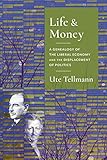Life and Money : The Genealogy of the Liberal Economy and the Displacement of Politics / Ute Astrid Tellmann.
Material type: TextSeries: Columbia Studies in Political Thought / Political HistoryPublisher: New York, NY : Columbia University Press, [2018]Copyright date: ©2017Description: 1 online resourceContent type:
TextSeries: Columbia Studies in Political Thought / Political HistoryPublisher: New York, NY : Columbia University Press, [2018]Copyright date: ©2017Description: 1 online resourceContent type: - 9780231182263
- 9780231544078
- 330 23
- HB74.P65 T45 2018
- online - DeGruyter
- Issued also in print.
| Item type | Current library | Call number | URL | Status | Notes | Barcode | |
|---|---|---|---|---|---|---|---|
 eBook
eBook
|
Biblioteca "Angelicum" Pont. Univ. S.Tommaso d'Aquino Nuvola online | online - DeGruyter (Browse shelf(Opens below)) | Online access | Not for loan (Accesso limitato) | Accesso per gli utenti autorizzati / Access for authorized users | (dgr)9780231544078 |
Frontmatter -- Contents -- Foreword -- Preface -- Introduction: The Economic and the Genealogy of Liberalism -- Part I. Life -- 1. The Invention of Economic Necessity -- 2. Savage Life, Scarcity, and the Economic -- 3. The Right to Live: Economic Man, His Wife, and His Fears -- Part II. Money -- 4. The Return of the Political and the Cultural Critique of Economy -- 5. The Economic Unbound: Material Temporalities of Money -- 6. The Archipolitics of Macroeconomics -- Epilogue: Critical Effects -- Notes -- Bibliography -- Index
restricted access online access with authorization star
http://purl.org/coar/access_right/c_16ec
Life and Money uncovers the contentious history of the boundary between economy and politics in liberalism. Ute Tellmann traces the shifting ontologies for defining economic necessity. She argues that our understanding of the malleability of economic relations has been displaced by colonial hierarchies of civilization and the biopolitics of the nation. Bringing economics into conversation with political theory, cultural economy, postcolonial thought, and history, Tellmann gives a radically novel interpretation of scarcity and money in terms of materiality, temporality, and affect.The book investigates the conceptual shifts regarding economic order during two moments of profound crisis in the history of liberalism. In the wake of the French Revolution, Thomas Robert Malthus's notion of population linked liberalism to a sense of economic necessity that stands counter to political promises of equality. During the Great Depression, John Maynard Keynes's writings on money proved crucial for the invention of macroeconomic theory and signaled the birth of the managed economy. Both periods, Tellmann shows, entail a displacement of the malleability of the economic. By tracing this conceptual history, Life and Money opens up liberalism, including our neoliberal present, to a new sense of economic and political possibility.
Issued also in print.
Mode of access: Internet via World Wide Web.
In English.
Description based on online resource; title from PDF title page (publisher's Web site, viewed 02. Mrz 2022)


